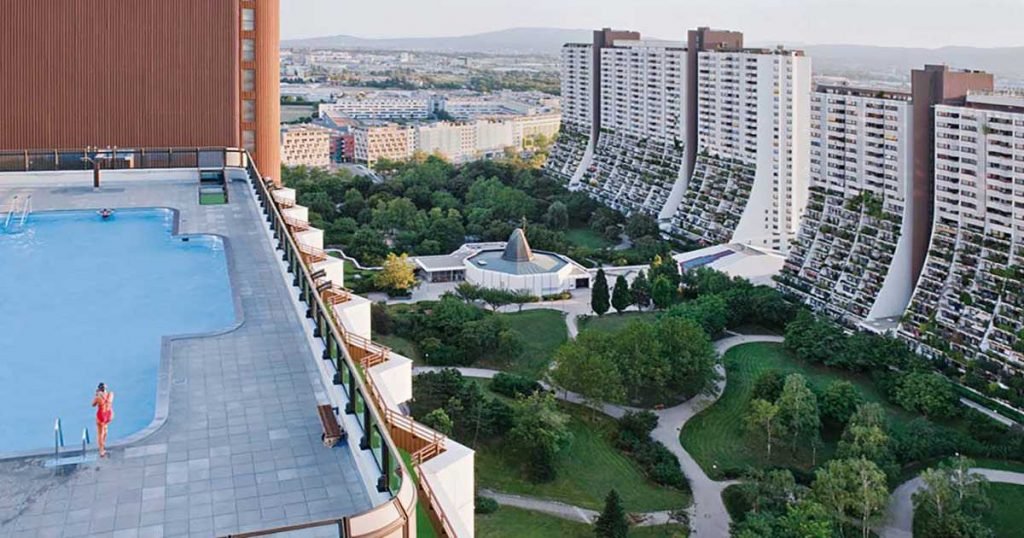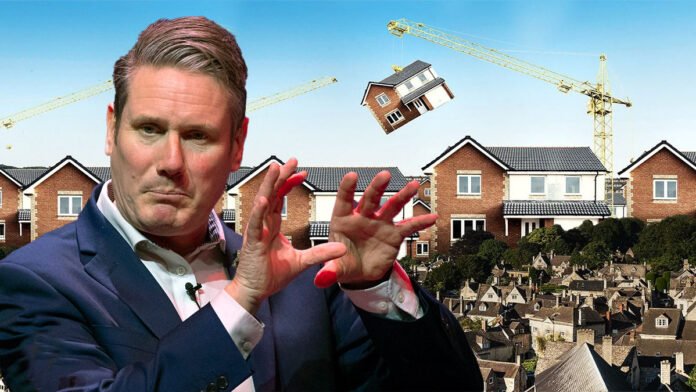Mortgage-Serfs and Neoliberal Lies: The Truth Behind Labour’s Housing Plan
No matter how Starmer’s outriders try to sell it, snake oil remains snake oil. What’s worse is that Labour’s entire manifesto rides on the precarious hope of Britain’s housing market booming. But as history has taught us time and again, every boom inevitably leads to a bust. If only Labour had dared to dream as Attlee and Nye Bevan once did, this could have been a different game entirely.
Instead, in the face of Britain’s most acute housing crisis in generations, Labour’s proposed solutions ring hollow, echoing the very neoliberal policies that have led us to this precipice. Their promise to “kick-start 1.5 million new homes” may sound appealing on the surface, but scratch beneath and you’ll find a thinly veiled attempt to create a new generation of mortgage-serfs, enslaved to the banking industry.
This isn’t the bold vision of a party ready to tackle the housing crisis head-on. Rather, it’s a timid capitulation to the same market forces that have consistently failed to provide affordable, quality housing for millions of Britons. By relying on a booming housing market to fuel their economic plans, Labour is setting up the nation for another devastating cycle of boom and bust, where we will all bear the brunt of the inevitable crash.
Britain’s Housing Crisis: Why Labour’s Solutions Fall Short
The scale of the crisis is staggering. The National Housing Federation estimates 8.5 million people are in housing need, with 1.2 million households languishing on housing waiting lists across the UK. In some regions, such as the North East, these lists have swollen by 50% in just one year. Yet, of the 240,000 homes built in 2022-23, a mere 41,000 were for affordable or social rent. Accounting for homes sold through Right to Buy or Acquire, the net gain in affordable rented homes drops to a paltry 25,000. At this glacial pace, it would take nearly half a century to clear current social housing waiting lists.
Labour’s plan, relying heavily on private sector development and planning deregulation, is doomed to failure. It allows greedy developers to pave over our cherished green spaces with shoddy, sub-standard housing built as cheaply as possible. Deregulation means lower quality materials and workmanship that homeowners will have to pay thousands to rectify down the line.
This approach ignores the lessons of history. After World War II, when Britain had been bled dry, Clement Attlee’s government invested in its people. From 1945 to 1951, they constructed over one million new residential properties, including a staggering 806,857 council houses. This gargantuan program amounted to a massive economic stimulus, creating jobs across every sector and uplifting not just the construction trades but adjacent supply industries.
Labour has not promised an increase in funding for the Affordable Homes Programme, which backs building projects, instead leaning on the idea that private-sector housebuilders can be pressed into including more affordable property in developments.
As Angela Rayner, the shadow communities secretary, has put it: “Developers have been let off the hook and for too long allowed to wriggle out of their responsibilities to provide new social and affordable homes. Labour will robustly hold them to account.”
Trew welcomed the fact that Rayner had promised “the biggest boost to affordable, social and council housing for a generation”, but pointed out that Labour had given no specific target for social homes. “It would be great to see a number, and the funding to deliver it.”
Without a plan for a significant increase in taxpayer-funded housing, Labour will be reliant on developers, who are in turn subject to the whims of the markets – as with other areas of its programme, such as the “green prosperity plan”, which require a heavy injection of private-sector capital.
Social Housing Over Neoliberalism: A Path to Rebuild Britain

What Britain needs now is not more debt-laden homeowners, but an ambitious program to build 1 million high-quality social homes owned by local councils. Imagine vibrant communities of beautifully constructed homes fitted with modern amenities and green spaces, owned by the public, not corrupt greedy developers. Council-run construction yards could train and employ the next generation of tradespeople – electricians, plumbers, carpenters – giving young people solid career paths while rejuvenating communities.
But why stop there? We British have a curious habit of ignoring successful policies from abroad unless they align with the failed economics of the US. It’s time we looked to our European neighbours for inspiration. Take France’s ‘One Percent’ law, for instance. In practice, one percent of the total budget for a public building in France, including taxes, must be allocated for art or design. This decentralisation has provided opportunities for artists across the country, beautifying public spaces and nurturing local culture. Imagine applying this principle to our social housing program – not just building homes, but creating living, breathing communities adorned with public art that reflects local identity and aspirations.
This approach would not only enhance the aesthetic appeal of our neighbourhoods but also create additional employment opportunities for artists and craftspeople. Moreover, instead of lining private pockets, any surplus rental income from these social housing projects could be reinvested locally in services, parks, and community centres – creating a virtuous cycle of public funding for public good. In this vision, homeownership becomes a choice, not a mandatory debt sentence. For millions of hard-working families, good quality social housing would provide true security and freedom, allowing them to thrive without the burden of crippling mortgages or exploitative rents.
Labour’s Housing Myth: Creating Mortgage-Serfs Instead of Solutions
Labour’s current strategy risks turning more people into permanent mortgage-serfs. As Tony Benn presciently warned, “People in debt are slaves to their employers”. We cannot allow this trap to ensnare another generation.
Of course, with many on the front benches of both major parties being landlords themselves, it’s little wonder they don’t advocate for public housing when there’s rent to be had. But we must not lose sight of the fact that a robust public housing program is an investment in Britain’s workers and communities – one that uplifts human dignity and prosperity for the many, not just the few at the top.
It’s a rigged system, alright. This cost of living crisis has seen the Bank of England wielding interest rates like a blunt instrument, ostensibly to curb inflation. In reality, this approach has created more hardship for the working class, pushing up private rents, mortgages, and loans. Meanwhile, the banks have reaped a windfall, making over £44.3 billion in profits due to these increases alone. It’s a nice time to be a banker, indeed, and how convenient that it coincides with the lifting of the bankers’ bonus cap.
The figures are staggering. The Big Four UK banks — Lloyds, NatWest, Barclays and HSBC — announced pre-tax profits of £44.3 billion, a whopping 66 per cent higher on average than their profits in 2018. Barclays led the pack with the highest percentage increase, their profits soaring by 88 per cent, from £3.5 billion to £6.6 billion. This is not growth; it’s profiteering on an industrial scale.
But the irony doesn’t end there. These same banks, along with financial institutions like BlackRock, are also the biggest shareholders in the energy companies whose profiteering sparked this cost of living crisis in the first place. They’re laughing all the way to the bank, quite literally, creaming off profits at both ends of this economic squeeze. It’s a perverse cycle where the average Briton’s struggle translates directly into padded bottom lines for these financial behemoths.
This isn’t just about numbers on a balance sheet. It’s about families choosing between heating and eating, workers taking on second jobs just to make ends meet, and young people seeing their dreams of homeownership vanish into thin air. All while the banking sector enjoys a bonanza of historic proportions. If ever there was a stark illustration of how our economic system is tilted in favour of the few at the expense of the many, this is it.
As we approach the ballot box, we must demand more than empty promises and rehashed neoliberal policies. We need a vision that harks back to the bold, transformative thinking of the post-war era. A vision that sees housing not as a commodity to be exploited, but as a fundamental right and a cornerstone of a just society.
The housing crisis is not just about bricks and mortar – it’s about the very fabric of our communities and the future we want to build. It’s time for a radical rethink of housing policy, one that puts people before profits and communities before corporations. This is the vision we must fight for, even if our current crop of politicians won’t. The future of Britain depends on it.
Common-Sense Socialism vs. Neoliberal Failures

While Starmer and his ilk seem content to stick with the status quo, ensuring British Capitalism is made safe forever and socialism is squeezed off the national agenda, many of us out there are still fighting for what makes sense. We’re looking at a new socialism, one of the common good that recognises a system can offer more for the many rather than everything for the few.
There really is an alternative: a common-sense socialism that aims to rebuild Britain by recognising that social infrastructure is as vital as transport, logistics, communications, and energy infrastructures. National health, welfare, education, and housing are integral to economic growth. We envision social housing built for the future, where private housing is a life choice, not a debt trap.
We support growth, but it must stem from today’s societal investments to achieve tomorrow’s sustainable development. This is not pie-in-the-sky thinking, but a practical approach to creating a fairer, more prosperous Britain for all.
The choice before us is stark: continue down the path of neoliberal policies that have failed us time and again, or embrace a bold new vision that puts people first. As we approach the ballot box, let’s remember that real change is possible. It’s time to demand more from our leaders and ourselves. The future of Britain – a future of fairness, opportunity, and shared prosperity – is in our hands. Let’s seize it.
Support Independent Journalism Today
Our unwavering dedication is to provide you with unbiased news, diverse perspectives, and insightful opinions. We're on a mission to ensure that those in positions of power are held accountable for their actions, but we can't do it alone. Labour Heartlands is primarily funded by me, Paul Knaggs, and by the generous contributions of readers like you. Your donations keep us going and help us uphold the principles of independent journalism. Join us in our quest for truth, transparency, and accountability – donate today and be a part of our mission!
Like everyone else, we're facing challenges, and we need your help to stay online and continue providing crucial journalism. Every contribution, no matter how small, goes a long way in helping us thrive. By becoming one of our donors, you become a vital part of our mission to uncover the truth and uphold the values of democracy.
While we maintain our independence from political affiliations, we stand united against corruption, injustice, and the erosion of free speech, truth, and democracy. We believe in the power of accurate information in a democracy, and we consider facts non-negotiable.
Your support, no matter the amount, can make a significant impact. Together, we can make a difference and continue our journey toward a more informed and just society.
Thank you for supporting Labour Heartlands












